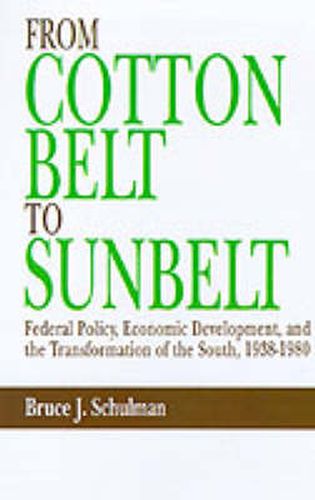Readings Newsletter
Become a Readings Member to make your shopping experience even easier.
Sign in or sign up for free!
You’re not far away from qualifying for FREE standard shipping within Australia
You’ve qualified for FREE standard shipping within Australia
The cart is loading…






This is a carefully executed study of the effects of federal economic policy in transforming the American South from the time of the New Deal to the present. Decrying the South’s economic backwardness and political conservatism, the Roosevelt Administration launched a series of aggressive programs to reorder the Southern economy. A generation of young liberal Southerners entered the national government to preside over these policies. After 1950, however, Keynesianism replaced New Deal reform as the mainstay of national economic policy, and the national security state supplanted the social welfare state as the South’s principal benefactor. Schulman here contrasts the diminished role of national welfare programs in the postwar South with the expansion of military and growth-oriented programs, analyzing their contributions to the South’s remarkable economic growth, and the excruciating limits of that prosperity. Schulman ultimately relates these developments to Southern politics and race relations. A forcefully argued work, From Cotton Belt to Sun Belt will be an invaluable addition to the literature, and an essential guide to students and scholars of federal policy and modern Southern history.
$9.00 standard shipping within Australia
FREE standard shipping within Australia for orders over $100.00
Express & International shipping calculated at checkout
This is a carefully executed study of the effects of federal economic policy in transforming the American South from the time of the New Deal to the present. Decrying the South’s economic backwardness and political conservatism, the Roosevelt Administration launched a series of aggressive programs to reorder the Southern economy. A generation of young liberal Southerners entered the national government to preside over these policies. After 1950, however, Keynesianism replaced New Deal reform as the mainstay of national economic policy, and the national security state supplanted the social welfare state as the South’s principal benefactor. Schulman here contrasts the diminished role of national welfare programs in the postwar South with the expansion of military and growth-oriented programs, analyzing their contributions to the South’s remarkable economic growth, and the excruciating limits of that prosperity. Schulman ultimately relates these developments to Southern politics and race relations. A forcefully argued work, From Cotton Belt to Sun Belt will be an invaluable addition to the literature, and an essential guide to students and scholars of federal policy and modern Southern history.